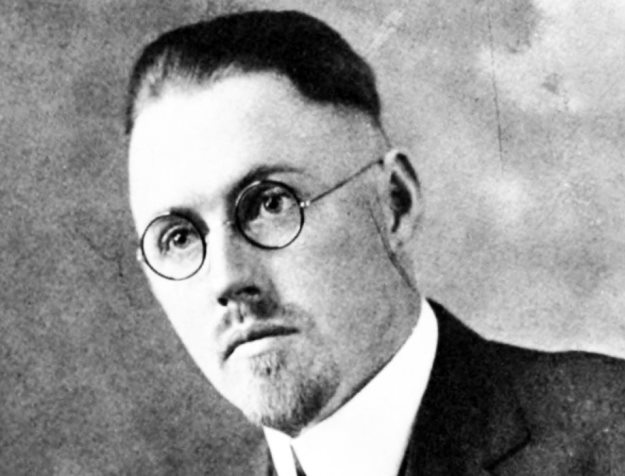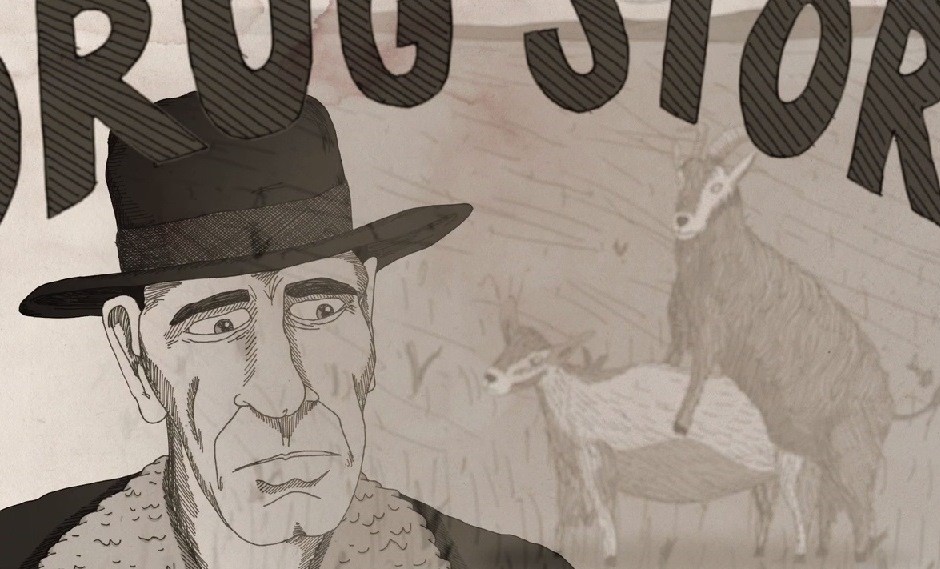Penny Lane’s documentary Nuts! works best if you have no idea who John Brinkley is; in that way, one is able to experience Brinkley as much of his medical clientele and radio audience would have experienced him – as an unknown doctor initially practising out of a remote part of Kansas, fighting against the self-interested and insular medical and media establishments.
For a film touted as being about a doctor who cures male infertility by performing a xenotransplantation on his patients by grafting on goat testicles, this film starts exactly as you’d expect it to. Brinkley, having established a drugstore in 1918 in the one-horse town of Milford, Kansas, is asked by a local man if he has anything available which can cure his infertility.
When Brinkley replies in the negative, he almost immediately spots a male goat mounting a female goat and going at it with gusto, and says, “You wouldn’t have any trouble, if you had a pair of those buck glands in you”. When Brinkley’s customer suggests that Brinkley transplant goat testicles into his body, Brinkley, after momentary hesitation, agrees and performs the surgery.
When the man that Brinkley performs the surgery on manages to impregnate his wife and produce a healthy child, Brinkley procures a herd of goats and begins marketing his breakthrough impotence surgery. And this is where the film gets really interesting.
Brinkley, apart from becoming a medical tycoon by establishing clinics in various parts of the United States, also becomes a pioneer in the then new field of radio broadcasting. He sets up an incredibly powerful broadcast tower, which apart from promoting his own medicine lines and quasi-moral programming – including a show where listeners would write in listing their medical symptoms for Brinkley to diagnose, and sent in two dollars – also played a variety of comedy shows and musical acts, including house bands such as the Carter Family. Brinkley was thus at the forefront of popularising country music throughout the United States. His radio broadcast tower in Mexico was so powerful that his station’s broadcasts could be heard as far away as Canada.
Brinkley’s ingenuity on the medical and media fronts made him a lot of enemies. The American Medical Association had attempted to stop his practices, and the Federal Radio Commission (the predecessor to today’s FCC) sought to revoke his broadcasting licence – even creating laws specifically targeting Brinkley.
Brinkley created numerous revolutionary techniques to get around these restrictions, becoming in turn a pioneer in advertising, broadcasting (he sent pre-recorded material from his Texas base to be broadcast from his Mexico based radio station), and even almost managing to succeed as a write-in candidate in the election for governor of Kansas. In that last effort, Brinkley is only prevented from winning due to corrupt political maneuverers from his mainstream political opponents.
Nuts! is presented via a clever mix of archival footage, audio and photographs, mandatory documentary talking heads, as well as animated re-enactments done by several different animators. But the most important narrative device used to tell this story is the narrative structure provided by Clement Wood’s biography of Brinkley, The Life of a Man.
Brinkley’s fall, when it comes, is of his own making. When Brinkley’s old nemesis Morris Fishbein, the editor of the Journal of the American Medical Association, writes two articles accusing Brinkley of fraudulent practices, Brinkley decides to sue. This requires Brinkley to take the stand, and none of his expensive but seemingly useless lawyers are able to protect him from his own lies.
Fishbein’s lawyer takes apart not only Brinkley’s medical practices, but Brinkley the man and his moralist image. Using The Life of a Man as his main weapon, Fishbein’s attorney dismantles the ridiculous life created by Clement Wood – commissioned by Brinkley to write the biography, and of course published by Brinkley, though he himself had never read it – to reveal the truth: that not only was Brinkley a medical fraud, but also an alcoholic who performed surgeries while drunk, a long time conman predating his goat testicle surgery, and a liar of such magnitude that it is impossible to tell if Brinkley knew how to tell the truth at all.
Brinkley loses the case; his entire industry, built up in large part via his boldness and the presentation of having the interests of the common man at heart, collapses overnight. Within three years, Brinkley, having had a leg amputated, and suffering under the weight of numerous lawsuits, bankruptcy and investigation by the IRS, is dead. A long way removed from the jovial introduction, one is left feeling profoundly devastated by this film – not out of sympathy for Brinkley, though even there I managed to find some – but for all those whose lives he came to destroy.
The film of course does take its own liberties with the truth, even if they fit both within the context of a 90 minute film and the rope-a-dope device used to tell the story. The chief liberty taken is the presentation of Brinkley’s practices being debunked almost overnight, following at best sporadic efforts from the government and the American Medical Association.
The truth of the matter is, of course, that Brinkley had faced several lawsuits throughout the 1930s leading up to his final, calamitous court appearance. But telling that story is much more difficult, and less conducive to the overall argument the film is trying to make.

John Romulus Brinkley
One can see modern parallels in the Lance Armstrong saga – for many casual observers, Armstrong went from being hero to villain within the space of a few weeks, even though his deception had lasted for years. The work put in to destroy the Armstrong myth had never ceased, but Armstrong’s media and commercial clout prevented those who sought to tell the truth from being heard.
Like Armstrong and Bill Cosby – whose own bestselling books on personal achievement and family values now fill the shelves of second hand book stores, much like The Life of a Man must have done in Brinley’s own time – Brinkley used his success as outward proof of his own virtue. And much as Cosby used his own shows, talk show appearances and speeches to present an image of being the consummate family man, Brinkley, too, used film to promote himself as a decent family man.
So while Nuts! is entertaining in its own right, the film’s main argument is one that is necessary albeit hard to stomach – that human beings, even those blessed with a good education, are not designed to be critical thinkers. We rely on emotion, instinct and what Friedrich Engels called the ‘worst kind of metaphysics’, namely ‘common sense’.
It is easy to laugh at those taken in by quacks like Brinkley, and the culture from which such characters can emerge as folk-heroes. But as one of the talking heads notes at the end of the film, who’s to say what people in 50 years or so will think of us and our assumptions about the natural world? In Brinkley’s time, people with little hope of being cured by conventional medicine were as willing to try alternative therapies as people are today.
While one can make the argument that people were both lesser educated and more poorly educated than today – especially when it comes to critical thinking – one needs to be reminded of how expensive Brinkley’s therapies were. While he may have started on a small scale, eventually his therapies, sold to the desperate and credulous, cost remarkable amounts of money and made Brinkley exceedingly wealthy.
Brinkley, a medical school failure who later bought his ‘qualifications’ from a degree mill, was able to manipulate the debate around his practices by the use of both a never-ending series of anecdotal accounts of happy customers as well as advertisements disguised as news. Those who sought to expose Brinkley as a fraud were either distrusted because of their links to the establishment, or never heard because those patients scarred by his techniques were too ashamed to come out in public after having been conned by Brinkley.
The film notes that the belligerence and arrogance of the American Medical Association also played its part. Instead of performing a more careful educative approach, and displaying sympathy for those looking for cures, or using the media in ways that would undermine Brinkley, the AMA and the government instead sought to demonise and make an outlaw of Brinkley; Brinkley however, having become a mainstream folk-hero, saw his reputation bolstered by these efforts. There are certainly lessons here for the mainstream medical and scientific establishments in their efforts to debunk modern medical quackery such as that of the alternative medicine movement.
As the message of this film sinks in, one is reminded of a particular scene late in the Jim Carrey-starring Andy Kaufman biopic Man On The Moon. Kaufman, diagnosed with terminal lung cancer, travels in desperation to the Philippines to seek a medical “miracle”, which turns to be the scam therapy known as psychic surgery. As the ‘surgery’ is performed on him, Kaufman realises that it is a scam, and laughs – the king of pranksters himself has been pranked.
That Carrey himself is now a main proponent of the anti-vaccination movement will not be lost on anyone. That the production of Nuts! was funded by the Tribeca Film Institute – part of the same body that saw the Tribeca Film Festival initially promote and then pull discredited doctor Andrew Wakefield’s anti-vaccination film Vaxxed – was certainly not lost on Nuts! director Penny Lane.
It is easy during a screening of Nuts! to laugh at those in the 1920s and 30s who were fooled by a combination of Brinkley’s domination of the media narrative and their own ignorance and desperation – after all, it seems so obvious now that Brinkley was a charlatan – but they are not so far removed from those of us today who are taken in by those providing easy answers and a chance to ‘stick it to the man’.
If anything, the modern day Brinkleys have far easier access to avenues to broadcast their views; a cultural environment where facts are often evaluated based on false equivalencies; and a market ripe for the picking – one that is distrustful of governments, corporations and medical bodies not because of the ignorance of the public, but because of the public’s own supposed expertise.
You too can see Nuts! at the Melbourne International Film Festival on Saturday August 13 at 2pm.
















